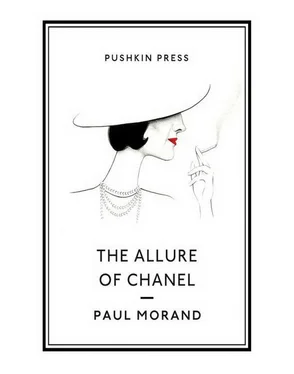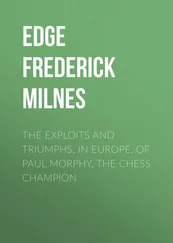Women today certainly look twenty years younger, they certainly continue to display unshakeable energy and behave as if they are never going to die, but nature always prevails over their efforts.
“How lovely Pauline looked, yesterday evening!” people continue to say, out of habit. And nobody dares say, or even think:
“No; she’s old and ugly.”
Beauty endures, prettiness passes. Yet no woman wants to be beautiful; they all want to be ever so pretty.
Bemoaning one’s fate is to cradle complacently the child that continues to live within every one of us, and who is of no interest to anyone. As for the real secret, which is to transform physical beauty into moral beauty, it’s the one trick which most women are incapable of performing.
If they were even distressed about this, that would be their salvation. But they are so sure of themselves!
A distressed woman doesn’t exist.
“I’m a little bit too plump …”
“I’m not all that plump …”
And the young encourage her in her false security. It’s the swan song. Young people’s compliments are delightful, as long as one resists them. Accepting them, that’s a serious matter.
In any case, it’s not so much a question of being young or old, as being on the right or the wrong side. I can call that a good or a bad painting: it’s original, functional, indelible. There are no human beings who are not original and interesting, as long as one has taken care not to teach them anything. There is good painting everywhere, in the trains, in the convoys of emigrants, but you have to know how to see it, to read it. Where women lose out is in having been taught; where the prettiest lose out is in having been taught not just that they are pretty, but in being taught how to be pretty.
People talk about physical care: but where is the moral care? Beauty treatments should begin with the heart and the soul, otherwise cosmetics are pointless.
Moral behaviour, the art of presenting oneself with charm, taste, intuition, people’s inner sense of life, none of these things can be taught. From a very young age, we are fully formed; education can change nothing. It is useless having teachers, teachers have lost many more men (and women, especially) than they have produced. Clemenceau’s remark about Poincaré: “He knows everything and understands nothing”, coupled with his remark about Briand: “He knows nothing and understands everything”, remains true, and always will.
Another axiom: there are intelligent women, but there are no intelligent women at a couturier’s. (Nor moral women; they would sell their soul for a dress.)
Mirrors no longer exist for the woman who is growing older. She replaces the mirror with conceit. It is true that when one reaches fifty, everything becomes difficult. A highly intelligent woman with a head of grey hair tells me:
“I’m calling it a day. Make me an outfit that I can wear from now until I die.”
“It’s impossible,” I reply to her. “A woman who is growing older must be in fashion; only a young woman can be in her fashion.”
Women should age with the times we live in, not with their own. People say to them: “Take this,” (which means: “In this black dress, people will see you have been beautiful”). But they don’t listen … The tragedy of the ageing woman is that she suddenly remembers that light blue suited her when she was twenty.
“Make me an old lady’s dress,” Hélène Morand says to me.
“There are no more old ladies,” I reply.
The shops see women as they ought to be; dressmakers’ salons see women as they are.
“Dora, Daisy, Dorothea, Diane, she’s an angel!” say their friends.
The angel returns her dress, having worn it at a soirée where everyone could admire it; the angel returns it saying that she had ordered a red velvet gown when in fact she had ordered it in black, as can be proved by the purchase order, signed by her.
The angel accompanies a friend to the fitting:
“This white velvet dress is pretty, but it’s not your style …”
“I had it made for the Rothschilds’ ball.”
“Trust me, come to Lelong’s instead. You’ll be another woman.” (How charming!)
The friend begs us to take the dress back. The next day the angel appears who had been unable to sleep thinking of her friend’s dress.
“That white velvet dress which was returned to you yesterday, I’ll take it, but you’ll have to sell it to me at half-price. It’s a sale item. OK?”
The angel always says: “OK?”
Sometimes the angel, having created a great deal of publicity about the clothes she had made for her, reappears at the fashion show and whispers in customers’ ears:
“Don’t make any decision, my dear, without having seen the Molyneux collection.”
If I am only too familiar with this last glint of romanticism, the Angel, so dear to Gide and to Giraudoux, it is because I have heard what the sales assistants say. Our sales assistants, generally former models, know their jobs, which they adore, wonderfully well. They know how to listen, to listen on their feet; they know the right time to sit down. They are the best confidantes (a woman is always frightened that her lady’s maid may blackmail her; but she has total trust in her sales assistant). The sales assistant has the enormous privilege of hearing the angel’s confessions.
“Should I leave him?”
“Does he love me?”
“What would Vera think of him? Is it a good match?” (and other equally banal and heavenly remarks …)
While they are recounting their life stories to the sales assistants (the women are all gossips), the sales assistant is not selling and the fitter is getting impatient; three dressmakers are waiting on the fifth floor. But the angel thinks only of herself. The angel does not know the price of time. The angel has a dress that suits her perfectly well, but wants to be able to say, at a smart lunch party:
“I must go round to Chanel’s.”
She returns again once, twice, three times, to no avail. Out of pure sadism the angel manages to prevent the sales assistant from continuing her job on another floor, which is to sell dresses and earn her commission, and to keep her unoccupied for an entire day.
At this point I must stop these stories from the fitting room.
I believe I have raised dressmaking to a certain level of importance. The purpose of my relating this is to say so and not to spread gossip.
I conclude by observing that one has to have experienced the company of women in order to know what a woman is like. The angel is a creature without any scruples, a real man-eater.
The angel is not bothered about pleasing; she thinks only of money. To the angel who believes I am a businesswoman and who asks me for financial tips, I reply:
“I am not Madame Hanau. Marthe Letellier, the greatest beauty of the pre-1914 period, thought of nothing but the Stock Exchange. The Marquise de J doesn’t need a footstool at Court, she wants an armchair in front of the tap at Saint-Phalle’s. And yet she’s an angel, and everyone in her circle is agreed on this. An angel never pays in cash, however (in my business, paying cash is like paying in instalments). An angel pays on the never-never.”
The angel, who is now a widow (for angels have a sex) and who, dressed in mourning, gives a grand dinner party:
“He would have hated me to be bored …”
Or:
“Come to dinner; we’ll talk about him …”
The theosophical angel:
“My religion forbids me to mourn.”
Man has a certain ingenuousness, but woman has none; as for the angel, it’s capable of everything. The angel knows it cannot be killed because it is immortal; it knows it cannot be put in prison, because it has wings.
Читать дальше












